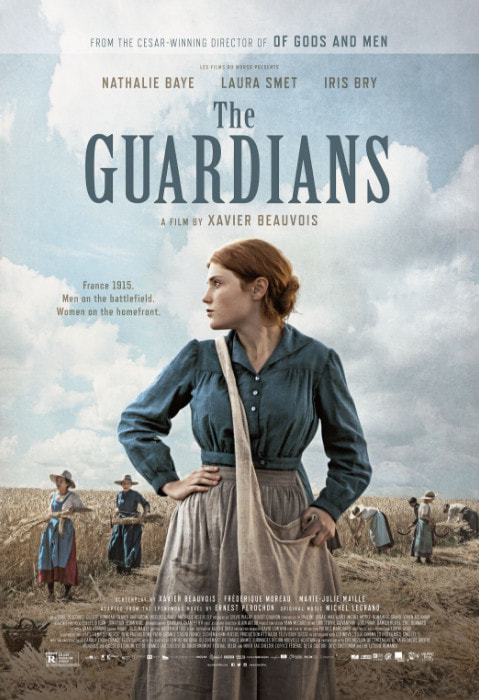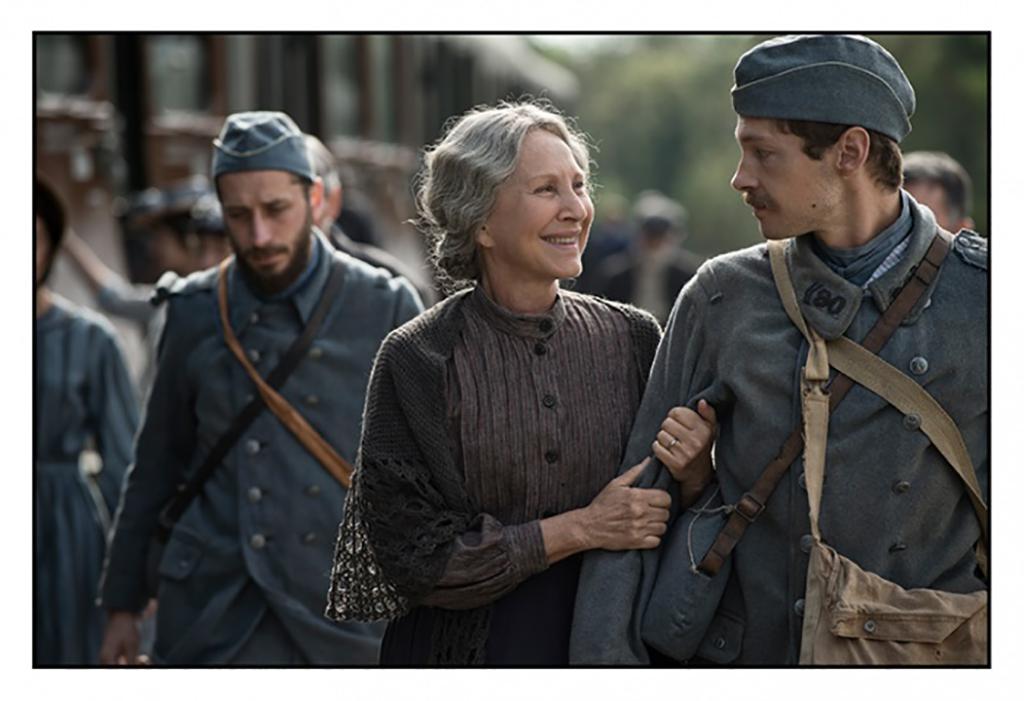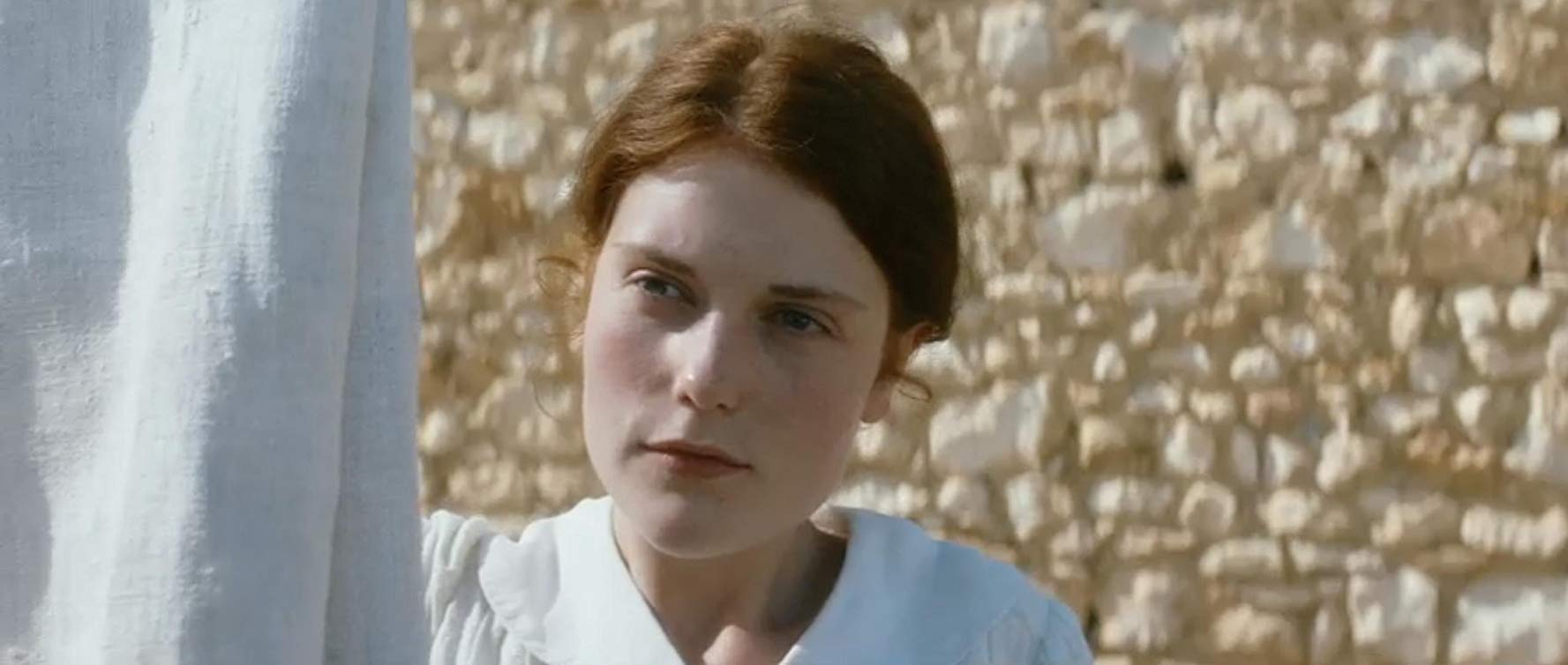
Reviewed by A. O. Scott / New York Times
“The Guardians,” unmistakably a war movie, is as quiet as a sigh. We barely hear a shot or a shell, and news of the horror of trench warfare — the story starts in 1915 — reaches us mostly through the words of men who have returned, briefly, from the front. Brothers, husbands, sons, these soldiers show up one at a time, unannounced, to their home in a rustic valley somewhere in France. And then they go away again, sometimes forever.
The battlefield might be on the other side of the world, or it might be a few miles away. This is a society where communication happens by letter, newspaper and word of mouth, where time moves slowly. On the Paridier family farm, life continues according to ancient agricultural rhythms, a daily round of chores and a seasonal cycle of tilling, planting and harvesting. With the able-bodied men off fighting, the work is left to the women, the guardians (in French, the title uses the feminine form of the noun) of tradition, honor and continuity.
The matriarch is Hortense (Nathalie Baye), who stoically and ably runs the household with her daughter, Solange (Laura Smet, who is Ms. Baye’s real-life daughter). Hortense’s two sons, Constant (Nicolas Giraud) and Georges (Cyril Descours), and her son-in-law, Clovis (Olivier Rabourdin), are away, and while the women miss them terribly, “The Guardians” also suggests that life without everyday male domination has its upsides. The only man on hand is Hortense’s husband, Henri (Gilbert Bonneau), who is too old for farm labor and too gentle to boss anyone around.
When Constant and Georges are home — especially Georges, the more arrogant brother — they pick up authority as if it were a coat they had left hanging on a hook near the door, unaware that their mother and sister had been wearing it perfectly well. But Hortense and Solange don’t complain, either about the extra work that falls to them when the men are absent or the power dynamics when they’re around.
Directed by Xavier Beauvois (“Of Gods and Men”) and adapted from a 1924 novel by Ernest Pérochon, “The Guardians” is a historical drama that doesn’t lose itself in decorative period detail, a beautifully photographed chronicle of rural existence that refrains from picturesque sentimentality and grinding misery, the usual modes for this kind of film. The characters, while they are constrained by customs and expectations that may seem old-fashioned to us, are modern to themselves. They think about the world and their places in it, look to the future with optimism and trepidation, and experience freedom within the constraints of circumstance.
In spite of the war, the Paridier farm prospers. Hortense hires Francine (Iris Bry), a young woman raised in a nearby orphanage, to help her and Solange. Francine proves to be both a tireless worker and an amiable presence around the farm. (Ms. Bry, in her first film role, is an exceptional presence onscreen, by turns warm and sharp, innocent and wise.) When Georges comes back on leave, an inevitable spark ignites between them, and the elements of romance and family melodrama overtake the historical narrative.
The history is there of course, not only of World War I but also of the technological and social upheavals that accompanied it. Within a few years, the Paridier women upgrade from a horse-drawn plow to a McCormick combine harvester to a gas-powered tractor. Other, less immediately noticeable changes are underway, having to do with relations between men and women and between citizens and the state.
At the center is a family crisis involving the three women. Hortense, in particular, is confronted with an ethical dilemma that subtly and powerfully reframes our understanding of her and of the story as a whole. Ms. Baye, one of the great living French screen actresses, is steely and magnificent, even as it is Ms. Bry who finally captures the film’s energy and the sympathy of the audience. It turns out that Francine and Hortense, with equal determination, are guarding two different ideals and that the true, endless war into which they are conscripted is between the past and the future.
“The Guardians,” unmistakably a war movie, is as quiet as a sigh. We barely hear a shot or a shell, and news of the horror of trench warfare — the story starts in 1915 — reaches us mostly through the words of men who have returned, briefly, from the front. Brothers, husbands, sons, these soldiers show up one at a time, unannounced, to their home in a rustic valley somewhere in France. And then they go away again, sometimes forever.
The battlefield might be on the other side of the world, or it might be a few miles away. This is a society where communication happens by letter, newspaper and word of mouth, where time moves slowly. On the Paridier family farm, life continues according to ancient agricultural rhythms, a daily round of chores and a seasonal cycle of tilling, planting and harvesting. With the able-bodied men off fighting, the work is left to the women, the guardians (in French, the title uses the feminine form of the noun) of tradition, honor and continuity.
The matriarch is Hortense (Nathalie Baye), who stoically and ably runs the household with her daughter, Solange (Laura Smet, who is Ms. Baye’s real-life daughter). Hortense’s two sons, Constant (Nicolas Giraud) and Georges (Cyril Descours), and her son-in-law, Clovis (Olivier Rabourdin), are away, and while the women miss them terribly, “The Guardians” also suggests that life without everyday male domination has its upsides. The only man on hand is Hortense’s husband, Henri (Gilbert Bonneau), who is too old for farm labor and too gentle to boss anyone around.
When Constant and Georges are home — especially Georges, the more arrogant brother — they pick up authority as if it were a coat they had left hanging on a hook near the door, unaware that their mother and sister had been wearing it perfectly well. But Hortense and Solange don’t complain, either about the extra work that falls to them when the men are absent or the power dynamics when they’re around.
Directed by Xavier Beauvois (“Of Gods and Men”) and adapted from a 1924 novel by Ernest Pérochon, “The Guardians” is a historical drama that doesn’t lose itself in decorative period detail, a beautifully photographed chronicle of rural existence that refrains from picturesque sentimentality and grinding misery, the usual modes for this kind of film. The characters, while they are constrained by customs and expectations that may seem old-fashioned to us, are modern to themselves. They think about the world and their places in it, look to the future with optimism and trepidation, and experience freedom within the constraints of circumstance.
In spite of the war, the Paridier farm prospers. Hortense hires Francine (Iris Bry), a young woman raised in a nearby orphanage, to help her and Solange. Francine proves to be both a tireless worker and an amiable presence around the farm. (Ms. Bry, in her first film role, is an exceptional presence onscreen, by turns warm and sharp, innocent and wise.) When Georges comes back on leave, an inevitable spark ignites between them, and the elements of romance and family melodrama overtake the historical narrative.
The history is there of course, not only of World War I but also of the technological and social upheavals that accompanied it. Within a few years, the Paridier women upgrade from a horse-drawn plow to a McCormick combine harvester to a gas-powered tractor. Other, less immediately noticeable changes are underway, having to do with relations between men and women and between citizens and the state.
At the center is a family crisis involving the three women. Hortense, in particular, is confronted with an ethical dilemma that subtly and powerfully reframes our understanding of her and of the story as a whole. Ms. Baye, one of the great living French screen actresses, is steely and magnificent, even as it is Ms. Bry who finally captures the film’s energy and the sympathy of the audience. It turns out that Francine and Hortense, with equal determination, are guarding two different ideals and that the true, endless war into which they are conscripted is between the past and the future.
DISCUSSION FOLLOWS EVERY FILM!
$6.00 Members / $10.00 Non-Members
TIVOLI THEATRE
5021 Highland Avenue I Downers Grove, IL
630-968-0219 I www.classiccinemas.com
We apologize—Movie Pass cannot be used for AHFS programs.
$6.00 Members / $10.00 Non-Members
TIVOLI THEATRE
5021 Highland Avenue I Downers Grove, IL
630-968-0219 I www.classiccinemas.com
We apologize—Movie Pass cannot be used for AHFS programs.








